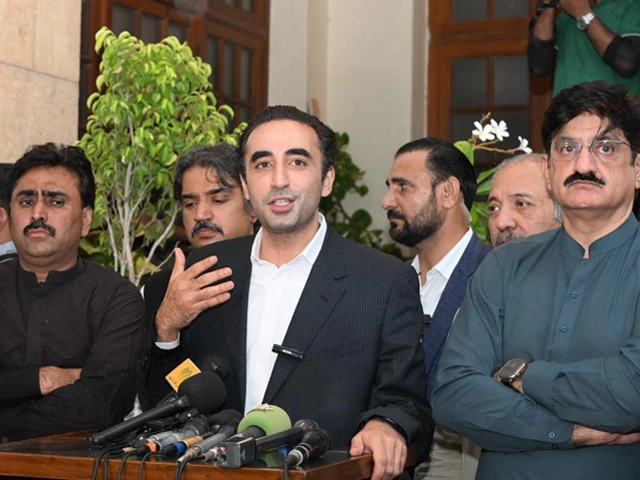The president of the Peoples Party of Pakistan, Bilawal Bhutto Zardari, has defended Benazir’s income support program as the most effective social security network of Pakistan and urged the federal government to use it for “immediate relief” to farmers affected by floods.
“We request that the victims of the floods receive support through the Benazir Income Support Program (BISP), as was done during the previous floods and even during Covid,” Bilawal said at a press conference at the house of the principal minister. “If this is not being done today, then my question is: what is the fault of the people in southern Punjab?”
He recalled that Bisp was introduced by the Popular Party of Pakistan (PPP) during a PML-N government. “All PML-N leaders had continually praised this program. If they have now taken a” change of U “, they should be asked why,” he said, adding that most of the beneficiaries were in Punjab and the initiative covered employment, education and other vital aspects. He pointed out that the program had been recognized internationally, with several countries following its model. “Those who criticize it may not know it well. Bisp covers employment, education and all aspects of social protection,” he added.
Read: ‘Each Pakistani wants to defend santas cities’
Previously, Punjab Minister of Information, Azma Bukhari, accused the PPP to push Sindh and Karachi to the “Middle Ages” despite governing the province for years. Without appointing Bilawal, he said that, unlike the prime minister and the Punjab cabinet, who was left with flood victims, the leaders of the PPP of Sindh announced visits only after the rain stopped.
Bilawal said Sindh had already announced a “Benazir Hari” card to support small farmers with DAP and Urea purchases. “It is better to spend money on our own farmers instead of sending it abroad importing wheat. Instead of imports, Pakistan should move towards wheat exports,” he argued.
He pointed out the Benazir Hari card initiative of the Government of Sindh, launched in its directives, whose objective is to register 1.5 million farmers throughout the province. Until now, 336,000 farmers have registered, including 42,000 in Sukkur and Ghotki, with RS18 billion already disbursed. The Multipurpose ATM card allows direct transfers of seeds for seeds, fertilizers and other supplies, with small farmers prioritized in the first phase.
Bilawal thanked the Federal Government for giving up electricity bills for flood victims, but urged more assistance. “If the Federal Government supports us, we can increase this help,” he said, asking for an agricultural emergency, IMF commitment in the acquisition of wheat and fiscal relief for farmers. He stressed that Punjab, particularly South Punjab, had suffered the greatest crop losses.
Read more: 42,000 registered farmers for Hari Card in Sukkur, Ghotki
In rehabilitation, he said that floods have two phases: rescue and relief, followed by rehabilitation. He quoted Sindh’s housing program for flood victims as a model for other provinces and criticized the Federal Government for not launching an international aid appeal. “In every past disaster, federal governments made such appeals. Why not now?” asked.
Foreign policy and internal policy
In international affairs, Bilawal praised the defense agreement of Pakistan and Saudi as “a good agreement” that had gained broad appreciation. He said that the Foreign Affairs Committee, led by Hina Rabbani Khar, had scheduled a meeting with the possibility of an informative session in the Chamber. “We will fulfill our parliamentary responsibilities,” he said.
In Palestine, he welcomed the strong debate in the UN General Assembly. “It shows that the struggle of the Palestinian people is fruit. The effects of Israeli attacks are seen in the form of Pakistan and Saudi agreements. I hope that Arab countries and those that support Israel also review their policies.”
Bilawal confirmed that he would meet with MQM leaders and urged the PML-N to share his draft on constitutional amendments. “If you want to make constitutional changes, they should talk to the PPP. We will make decisions through the consultation,” he said.
When asked about the recent situation in Baluchistan, Bilawal said: “There has been an observable increase in terrorism in Baluchistan and Khyber-Pakhtunkhwa. This will inevitably create a national security dynamic that will affect society. It is not a military solution in Baluchistan, it is political.”
Also read: The Jaffar Express explosion at the Mastung of Baluchistan, hurts a dozen passengers
He also recognized Karachi’s pressing problems, particularly water scarcity. He said that the priority of the provincial government was to resolve the water crisis through projects such as the Hub channel, followed by roads and other works, while emphasizing the need for coordination, so the newly built infrastructure is not damaged by public services work.
On federal and professional relations, Bilawal said that Sindh had received support under the current government and thanked Prime Minister Shehbaz Sharif and the Vice Prime Minister Ishaq to maintain his promises. Despite the challenges in the Public Sector Development Program (PSDP), he said that the federal government had contributed fairly, although “size can still be discussed.”
He added that the largest housing program and the largest agrarian reform from Zulfikar Ali Bhutto were possible due to federal support.




